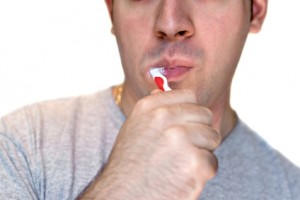 You may have learned from a young age to put a little “elbow grease” into whatever you’re cleaning—whether it’s scrubbing a stained floor or scouring an old pot containing day-old food remains. Don’t take this approach when cleaning your teeth, though. People often go by the mantra that “more is better” when trying to scrub stains and food debris off of their teeth, but brushing too hard can actually have many negative dental effects.
You may have learned from a young age to put a little “elbow grease” into whatever you’re cleaning—whether it’s scrubbing a stained floor or scouring an old pot containing day-old food remains. Don’t take this approach when cleaning your teeth, though. People often go by the mantra that “more is better” when trying to scrub stains and food debris off of their teeth, but brushing too hard can actually have many negative dental effects.
If you brush your teeth too hard, you could be removing more than just stains: You are likely removing gum tissue, which can lead to gum recession over time. This can cause discomfort because you essentially are harming the gums that are designed to protect the roots of your teeth.
When your soft roots are exposed, the roots can wear down, and this may cause sensitivity. You may be doing damage to the nerves located in the roots as well. The gums are also important in that they guard your roots against tooth decay, which occurs when bacteria produce acids that eat away at your teeth.
The very teeth you are attempting to help can also be damaged from brushing too hard. This happens because you may end up damaging your enamel—the hard tooth covering that is designed to protect your teeth.
Brushing your teeth involves a repetitive motion. If you are brushing too hard day after day, this only exacerbates the damage you are doing to your gums and teeth. You still need to brush your gums and teeth regularly, though, because brushing removes sticky food debris, called plaque. This prevents serious problems such as cavities and gum disease.
Your dentist will instruct you on how to properly brush your teeth and gums so that you can keep them healthy long-term. Contact the office of Dr. Howl to find out more about how we can address all of your dental concerns and keep your teeth attractive and intact for years to come.
